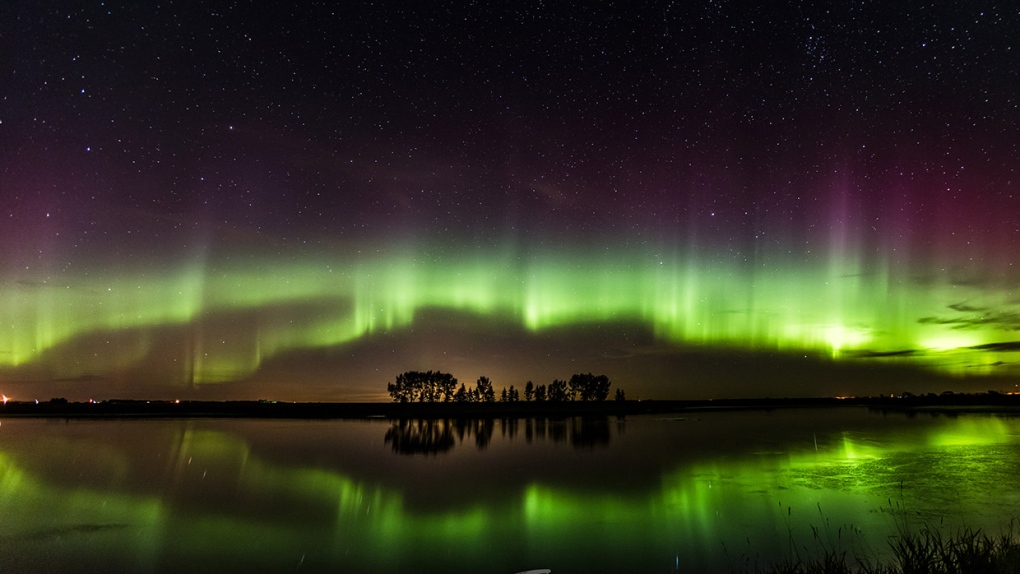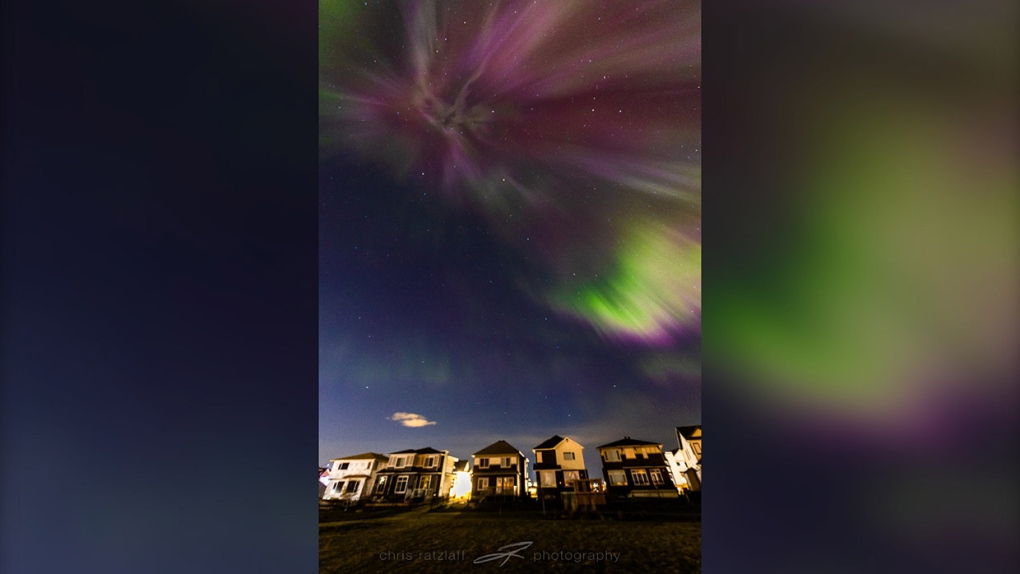'Those are our ancestors in the sky:' Sacred beliefs about the Northern Lights
Albertans have been spoiled with a lot of sightings of the Northern Lights recently but not everyone believes you should actually look at the Aurora Borealis.
Simply put, the recent increase in those magical night skies in the prairies comes down to the sun’s cycle and longer nights.
“We’re starting to see the sun pick up in its 11 year cycle and in its activity and we’re seeing an uptick in sun spot numbers. Associated with sun spots are these solar flare events,” explains Roland Dechesne with Royal Astronomical Society of Canada.
There are scientific explanations but there are also cultural ones. Many Indigenous peoples have a special relationship with the Northern Lights.
Joely Bigeagle-Kequahtooway is Nakoda Cree Saulteaux and says she was taught at a young age not to look at, whistle at or disturb the sacred lights.
“Those are our ancestors in the sky and what that means literally and figuratively is we’re not alone on this planet,” she says. “The stories I was told were those Northern Lights represent this timeless energy, timeless energy period of when our ancestors lived on this land.”
 Northern Lights, outside Calgary, November 2021
Northern Lights, outside Calgary, November 2021
(Photo courtesy Chris Ratzlaff)
BigEagle-Kequahtooway says she remembers an experience when she was younger driving with a group of friends when they spotted the Northern Lights.
“As young people you want to challenge the teaching of 'don’t whistle' or 'don’t be loud or boisterous' or 'don’t be looking at the Northern Lights' because those are our ancestors and if you do they might come down because you’re calling them,” she says. “I remember this one drive between where I’m from and this city...we seen the Northern Lights and we were challenging this teaching and suddenly it seemed like the Northern Lights surrounded us and we became quiet, because were weren’t sure to why it seemed they were closer than they should have been.”
She says she’s heard different stories from different cultures but all have the same theme.
“The overall teaching is just a respect for Mother Nature and the respect for the natural laws of this earth,” she says.
She says while many don’t agree with taking images of the Northern Lights she believes culture has to evolve.
"To me it comes down to if you do take photos of Northern Lights and you have reverence and respect and also know the meaning, then for me I think you can take photos."
CHASING THE NORTHERN LIGHTS
Chris Ratzlaff is behind the Alberta Aurora Chasers and has been hunting down the Northern Lights for more than a decade.
“When you’re looking up at the sky and it’s dancing and shimmering and moving all over the place, every time it’s magical. Every time you’re just like, ‘holy cow!’”
He has been thrilled with the recent increase in light shows and says it’s hard to know exactly when they’ll make an appearance and that’s something the Facebook group tries to flag and educate people about.
 Joely Bigeagle-Kequahtooway is Nakoda Cree Saulteaux and says she was taught at a young age not to look at, whistle at or disturb the sacred lights.
Joely Bigeagle-Kequahtooway is Nakoda Cree Saulteaux and says she was taught at a young age not to look at, whistle at or disturb the sacred lights.
(Photo courtesy Chris Ratzlaff)
“Not only is it about catching the aurora and knowing when to be out and see it which means going out in the middle of the night and staying out to three or four a.m. sometimes,” he says. “There is also the community we’re involved with. The community has exploded in the last year we’ve almost tripled in size to close to 150,000 members.”
Ratzlaff finds the Indigenous lens on the Northern Lights fascinating and says it makes him appreciate the spectacular sights even more.
“It really brings out the sense how cultural and how much apart of our identity aurora can be.”
CTVNews.ca Top Stories

W5 Investigates A 'ticking time bomb': Inside Syria's toughest prison holding accused high-ranking ISIS members
In the last of a three-part investigation, W5's Avery Haines was given rare access to a Syrian prison, where thousands of accused high-ranking ISIS members are being held.
Trudeau Liberals' two-month GST holiday bill passes the House, off to the Senate
The federal government's five-page piece of legislation to enact Prime Minister Justin Trudeau's promised two-month tax break on a range of consumer goods over the holidays passed in the House of Commons late Thursday.
Irregular sleep patterns may raise risk of heart attack and stroke, study suggests
Sleeping and waking up at different times is associated with an increased risk of heart attack and stroke, even for people who get the recommended amount of sleep, according to new research.
California man who went missing for 25 years found after sister sees his picture in the news
It’s a Thanksgiving miracle for one California family after a man who went missing in 1999 was found 25 years later when his sister saw a photo of him in an online article, authorities said.
As Australia bans social media for children, Quebec is paying close attention
As Australia moves to ban social media for children under 16, Quebec is debating whether to follow suit.
Notre Dame Cathedral: Sneak peak ahead of the reopening
After more than five years of frenetic reconstruction work, Notre Dame Cathedral showed its new self to the world Friday, with rebuilt soaring ceilings and creamy good-as-new stonework erasing somber memories of its devastating fire in 2019.
Canada Post temporarily laying off striking workers, union says
The union representing Canada Post workers says the Crown corporation has been laying off striking employees as the labour action by more than 55,000 workers approaches the two-week mark.
Can't resist Black Friday weekend deals? How to shop while staying within your budget
A budgeting expert says there are a number of ways shoppers can avoid getting enveloped by the sales frenzy and resist spending beyond their means.
Montreal shopping mall playing 'Baby Shark' song to prevent unhoused from loitering
A shopping mall and office complex in downtown Montreal is being criticized for using the popular children's song 'Baby Shark' to discourage unhoused people from loitering in its emergency exit stairwells.

































